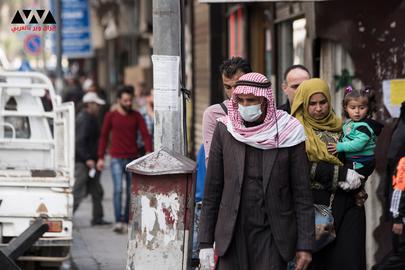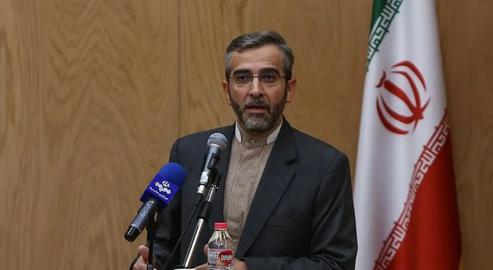Syria has witnessed a surge in the number of newly-recorded coronavirus cases. With hospitals struggling to keep up with demand, IranWire has learned that more and more patients are being forced to treat severe Covid-19 symptoms at home.
At the time of writing, the official number of cases of SARS-CoV-2 infection in Syria stood at 17,077. Among the recent cases were President Bashar Al-Assad and his wife, who are now recovering. Unofficial statements by officials and medical workers indicate the number of actual cases is many times the figure so-far reported to the World Health Organization.
A medical worker in Syria has told IranWire that in recent days, the number of newly-detected cases has risen by 10 to 20 percent on a daily basis. Family connections and “cronyism” are reportedly allowing some Covid-19 patients to jump the queue for hospital beds, while other Syrians are scrambling to buy their own oxygen cylinders for home use in the middle of a financial crash.
Nascent Signs of a Third Wave in Syria
In a live social media broadcast on March 20, Dr. Nabough Al-Awa, a member of the official advisory team tasked with combatting coronavirus in Syria, declared that the country had entered a “third wave” of coronavirus infections.
This new wave, the doctor stressed, would likely be more damaging than the last because the new strain of coronavirus first detected in Britain is now in circulation in the country. Dr. Al-Awa called on healthy people to keep wearing masks and to quarantine at home if they fall ill. He also requested that medical consultations take place by phone as far as possible.
The Syrian Ministry of Health has taken to publishing daily videos and images on its official website and social media accounts, encouraging people to take the necessary measures to prevent the spread of the virus. It has also confirmed that intensive care units in Damascus are now operating at capacity, and Covid-19 patients in need of intensive care are having to be transferred to other governorates.
In an official statement, Health Minister Dr. Hassan Muhammad Al-Ghobash asked the directors of public health providers in Damascus to stop routine planned operations due to the increase in coronavirus cases, "with the exception of emergency operations and cancer treatment".
Some hospitals have also been asked to run at maximum capacity to accommodate Covid-19 patients, as well as to extend the residency system to all doctors and to put sub-residents on shifts and on call. They include Al-Mujtahid Hospital, Al-Hilal Hospital, The Eye Hospital, The Faculty Hospital and Al-Basil Hospital for Cardiac Diseases and Surgery in Damascus.
In the Syrian capital, the number of officially-confirmed coronavirus cases is understood to have reached 3,681, with 351 deaths formally recorded as of 21 March. The next worst-hit appears to be the city of Latakia, with a total 2,705 officially-confirmed cases and 121 deaths. In Aleppo the authorities have declared 2,410 cases and 118 deaths.
Online PCR Analysis for the Few, Not the Many
The Syrian Ministry of Health has set up an online portal for patients to register and book appointments for coronavirus testing. It aims to provide results online without requiring patients to return to test centers.
Tests are taking place at state-run and private laboratories spread over six governorates, including Damascus, Damascus Countryside, Aleppo, Homs, Latakia, and Tartus. There are 21 such facilities in total throughout Syria.
The cost of a PCR to test for coronavirus is 126,000 Syrian pounds ($US29). The average government wage in Syria is just 65,000 Syrian pounds, calling into question the number of citizens who will actually be able to afford a test.
Syrians Opt for Home Treatment due to Hospital “Favoritism”
Almost a month ago on February 28, Dr. Wael Al-Daghli, director of health education at the Damascus Health Directorate, told Sham FM radio station that in his view Syria had already entered a “third wave” of coronavirus infections.
The station also heard that that week, some volunteer teams had seen a three-fold increase in demand for oxygen cylinders, with one facility using 45 to 50 cylinders a day to treat Covid-19 patients compared to the previous 10 to 15.
A source at Al-Assad University Hospital in Damascus told IranWire that the number of patients suspected of having coronavirus had increased since mid-February, adding that almost all of its new Covid-19 inpatients needed oxygen. The medical worker added that only a small percentage of those presenting at hospital with Covid-19 symptoms were being admitted, and those mostly due to “connections and cronyism”.
Fatima, a primary school English teacher in Damascus who contracted Covid-19 along with her entire family, told IranWire most symptomatic cases she knows of were treated at home. A bed in a medical facility, she said, could only be secured “through connections and favoritism or by paying bribes".
IranWire understands that due to hospital bottlenecks and fears about poor treatment in government facilities, many people with Covid-19 symptoms are now trying to secure their own oxygen cylinders to treat themselves at home.
The factory cost of filling an oxygen cylinder is 2,500 to 8,000 Syrian pounds. In recent months a range of coronavirus-related social initiatives have sprung up in Syria, including one that provides citizens with oxygen cylinders and other equipment.
A volunteer told IranWire that they had recently seen a daily uptick in cases of 10 to 20 percent, and patients coming to them now were in a “more severe” state than those in previous months. Individual demand for oxygen cylinders, he added, had more than doubled since the end of February.
Other initiatives include Aqimha [Sterilize It], an organization that supports private medical centers providing on-duty doctors 24 hours a day, and Samaa Hakim, a cellphone app connecting people with suspected Covid-19 symptoms to doctors.
Economic Crisis Undermines Social Distancing
The Syrian government has imposed a number of non-pharmaceutical interventions to try to curb the spread of coronavirus, including mandatory mask-wearing in government buildings, shops and markets, and on public transport. Shisha can only be served outside, and hotels, restaurants and coffee shops have been ordered to operate at half capacity. Events and conference venues can run at 40 percent capacity.
IranWire's correspondent in Damascus has confirmed that none of these measures are being adhered to on the ground. Crowding and daily queues can be observed as normal at state-run bakeries, subsidized supply shops, gas stations and on public and private transportation.
Sarah, a bank teller at a mall in Damascus, says protecting herself from coronavirus is her “last concern” given the disastrous economic situation. The value of the dollar has now exceeded 4,000 Syrian pounds and, she says, most people do not have the “luxury” of buying masks or disinfectants while struggling to put food on the table. People’s non-adherence to guidelines, she says, is "a strange situation, but we cannot blame them.”
The gradual easing of social distancing measures in areas controlled by the Assad regime is currently due to start at the end of April 2020. Meanwhile, the Minister of Health has confirmed that an as-yet unspecified quantity of Covid-19 vaccines have been procured from a “friendly country” and some frontline health workers have begun to receive the first jabs.
On February 21 this year, Israel purchased a shipment of the Russian-made Sputnik-V vaccine for the Syrian regime as part of a deal, brokered by Russia, to exchange two Syrian prisoners for the release of an Israeli woman.
visit the accountability section
In this section of Iran Wire, you can contact the officials and launch your campaign for various problems





























comments